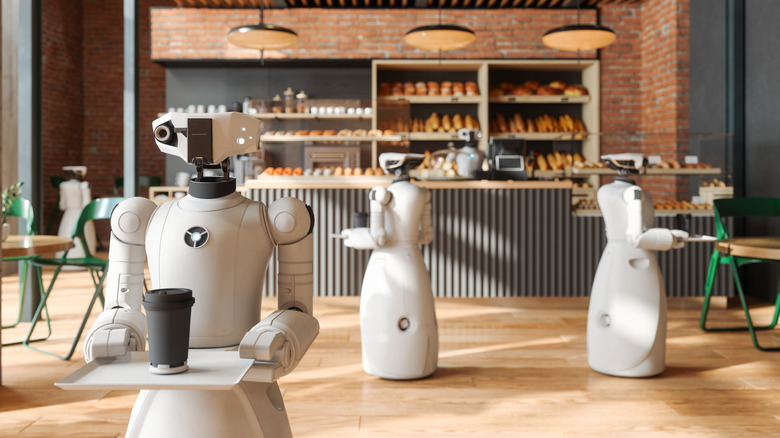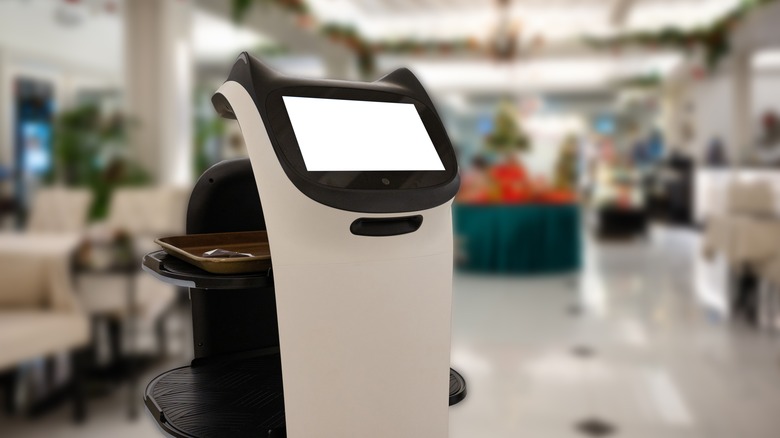What Fast Food AI Could Mean For Restaurant Employees
Hysteria around robots taking over the world has been a social topic for nearly a century. There's even a robot worker in the 1927 cult classic "Metropolis." But, lately, the concept of a robot workforce has been moving from the realm of science fiction into real life, and it isn't relegated to ordering kiosks and grocery store self-checkouts anymore. In January 2023, one Twitter user posted a video of a fully-automated Taco Bell drive-thru, in which the entire experience was completed without a single human interaction. The customer's order was taken by AI, then the bagged meal was sent to the customer's car via an automated chute, not unlike the tubes that send drive-thru bank-goers their withdrawals. Some McDonald's stores are doing it, too.
Etymologically, the word "robot" itself is derived from the Czech word robota meaning "forced labor," which is theoretically what fast food service establishments are trying to do with AI. In theory, rather than replacing human workers, robots would be changing the reality of how human jobs in are done on an everyday basis and, ideally, making them a whole lot easier. Whether ease is going to be the actual outcome remains to be seen, and so far, it looks like the opposite is true — and restaurants could be next.
AI could ease the burden on overworked servers
Especially against the backdrop of the national labor shortage, restaurant employees are often forced to wear multiple hats to compensate for understaffing. According to the U.S. Chamber of Commerce, over 50 million U.S. workers quit their jobs in 2022 alone, with the highest quit rate belonging to the hospitality sector. AI technology could take care of some of the background tasks, as was the case when Panera launched its robotic coffee system last year. Human employees must still change the coffee filters and replace the grounds, however, the automatic monitoring of the coffee pot and regulating the temperature eases at least one task for workers and also enhances customer experience by elevating product quality.
Even in these new, seemingly robot-run drive-thrus, the human employees aren't totally gone — they're just hidden, prepping the orders in the kitchen. Eliminating human interaction certainly has its benefits. Ask any industry professional and they'll gladly tell you that working customer service can be the pits. The onslaught of abuse that restaurant employees have been forced to endure at the hands of frustrated customers is no secret, ranging from daily verbal abuse to threats, sexual harassment, or having food thrown at them. These kinds of mistreatments are horrific and not to mention far below the pay grade of human workers, which is where AI comes in as a kind of front line defense. But the larger ramifications of dehumanizing the restaurant experience might go a lot deeper.
Determining which parts of the service industry require a human touch
Jack in the Box has already started implementing robot workers that can dispense drinks and operate the deep fryers, and at Chipotle, there's "Chippy," a tortilla-chip-making AI. At the time of their release, Jack in the Box published a press release promising that the AIs would simply aid and support human employees, not replace them. But, did Chippy take the job of Chipotle's previous underpaid chipmakers? It seems tough to imagine otherwise.
Looking forward, the future of AI and human restaurant servers might be more of an intermingling than one extreme or the other. This could translate to the restaurant industry in the form of a robot dishwasher, or robotic servers delivering dishes to the table while expert, human chefs craft beautiful meals in the kitchen. Still, while this might make things easier for some employees, it also paints a new and perhaps unsettling scenario of a dehumanized dining experience. Plus, cooks wouldn't be able to work their way up starting with grunt work. Anthony Bourdain famously professed that his first job as a dishwasher made him fall in love with the industry and changed the course of his life forever. Sure, an AI sommelier might be able to recommend highly specialized pairings from a data bank of idiosyncratic wine qualities, but whether this seems like a technological stride made in the name of efficiency or a Metropolis-esque nightmare remains to be seen.


